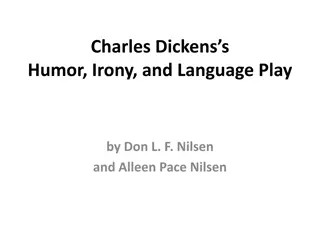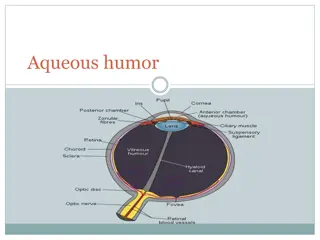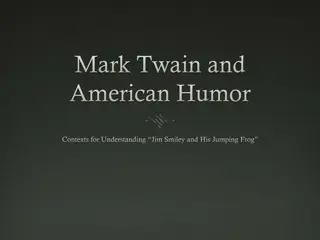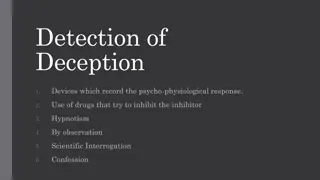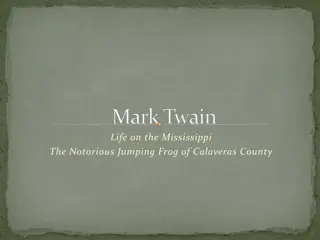Deception and Humor in "The Rivals" by Sheridan
In "The Rivals" by Richard Brinsley Sheridan, a tale of deception unfolds as characters plot to deceive one another. Mrs. Malaprop unwittingly becomes part of a scheme to help Lydia elope with Ensign Beverley. Jack Absolute successfully gains the trust of both Lydia and Mrs. Malaprop through clever manipulation, leading to dramatic irony and comedic misunderstandings. The play is filled with humor, mistaken identities, and absurd situations, creating an entertaining narrative of love and deception.
Download Presentation

Please find below an Image/Link to download the presentation.
The content on the website is provided AS IS for your information and personal use only. It may not be sold, licensed, or shared on other websites without obtaining consent from the author.If you encounter any issues during the download, it is possible that the publisher has removed the file from their server.
You are allowed to download the files provided on this website for personal or commercial use, subject to the condition that they are used lawfully. All files are the property of their respective owners.
The content on the website is provided AS IS for your information and personal use only. It may not be sold, licensed, or shared on other websites without obtaining consent from the author.
E N D
Presentation Transcript
Lectures 9 & 10 Hello Dear Students Last lecture we had an idea about Ensign Beverley s plan to deceive Mrs. Malaprop, throughout the letter that Mrs. Malaprop has intercepted. After reading the letter to Mrs. Malaprop, Absolute suggests a plan that would help Mrs. Malaprop get rid of Beverley: 2
Lectures 9 & 10 wink at Lydia s corresponding with [Beverley] for a little time , and let her plot an elopement with him- then do you connive at her escape- while I, just in the nick, will have the fellow laid by the heels, and fairly contrive to carry her off in his stead . (P.60, ll.87-91) 3
Mrs. Malaprop approves of the plan and feels delighted. Jack asks Mrs. Malaprop to tell Lydia that Beverley wants to see her. Soon he feels that he slipped up, but he covers his slip by telling her that she should tell, by way of jest, that it was Beverley who is there waiting to see her in order to get Lydia come down fast. 4
Notice how Jack Absolute succeeded in winning both Lydia s and Mrs. Malaprop s trust; the first by making her strongly attached to him, and the second by making her believe that they are conspiring to deceive Lydia. Act III, Scene iii is a wonderful example of a dramatic irony. The humor of the scene arises mostly from Mrs. 5
Malaprops mistaken assumption of Jacks identity. She makes herself appear ridiculous by triumphantly proclaiming her invincibility(the quality of being too powerful to be defeated) as a guardian to Lydia. Elude my vigilance, will he? . He s very likely to enter these doors! We ll try who can plot best . (p. 60, ll. 81-83) she exclaims this as Beverley stands in her very drawing room, preparing with her assistance to meet privately with Lydia. 6
Mrs. Malaprop leaves to call on Lydia , and Jack is alone reflecting that he may lose Lydia if he uncovers his true identity to her . So he turns his back to the door. After she enters the room, Lydia begins to reflect on how hapless she is to be obliged to listen to the loathsome addresses of a stranger to one s heart . 7
But as Jack turns around, Lydia feels surprised to see Beverley. And here we find how Jack will trick Lydia by telling her that he deceived her aunt. He tells her that he heard that Jack was coming to visit her and that he found a way to keep him away and come in his place. 8
See how he pleases her with the story of how he deceived her aunt, although Lydia does not realize that she herself is being tricked. To win her heart, Beverley pleads with Lydia to elope with him. He makes a romantic speech about how happy he would be to be penniless with her. A speech which is full of deceptions. For we know that he is keen to get her complete fortune. 9
So a mild comic anxiety that Jack will overextend himself and be caught, with discomfiting if not disastrous consequences, is increased by Mrs. Malaprop s secret arrival on the scene while Jack as Beverley woos Lydia. Jack escapes this time, and by the end of the scene each character is in possession of only part of the essential knowledge we as audience have. 10
Mrs. Malaprop knows Jack is Absolute, but not that he is Beverley; Lydia knows Jack is Beverley, but not that he is Absolute; and Jack knows that he is both, but he is unaware of the depth of Lydia s commitment to the romantic imposture. The two women see themselves as clever- Mrs. Malaprop in preventing Beverley from seeing Lydia, Lydia in duping her aunt- while both are really dupes of Jack. 11
In Act III, Scene IV, Bob Acres with his new hairstyle meets his friend Sir Lucius in his lodgings. Acres is an imaginative combination of characteristics- country naturalness, naivety, foppishness and false bravado. So Sheridan s first intentions seem to have been to combine the characteristics of a fop with those of a country bumpkin. 12
The thought was original, but it was also typical of the time. The humor of Acre s character springs from his failure to realize the difference between what he is and what he wishes to be. 13
He is actually a perfect example of Sheridans exploitation of an idiosyncratic character for its own sake. Bob Acres is technically one of the four rivals for Lydia s hand (the others of course are Sir Lucius, Jack and Beverley . 14
Sir Lucius asks why Acres has come to Bath. Acres tells him that he fell in love with a woman, got encouragement from her family, then followed her to Bath only to find that her friends plan to marry her to someone else. The cause of this, he explains, is another love, Beverley. 15
Sir Lucius asks if Acres rival has taken his place unfairly, to which Acres without thinking agrees. Lucius suggests that Acres must call his competitor to a duel. Despite Sir Lucius s attempts to stir Acres anger, Acres feels that there is no reason for him to be angry before he calls for a duel. 16
But Sir Lucius responds : What the devil signifies right, when your honor is concerned? Do you think Alexander the Great ever inquired where the right lay? (p.69, ll. 83-85) 17
Let me give you an idea about how the British nobility in the late 18th century viewed honor as an important social institution. To be considered a gentleman one had to be honorable, which meant being truthful, virtuous and well- mannered. At the same time being honorable required courage: both physical courage and the courage to defend one s honor. 18
If one gentleman insulted another, for example by accusing him of lying, or by making advances on his wife or beloved, the insulted gentleman would be obligated by the rules of honor to challenge the offending gentleman to a duel. If he failed to do this, his reputation would be ruined. 19
Sir Luciuss approach to dueling is to disregard many of the conventions about what causes justify challenging someone to fight. In this sense Sir Lucius resembles Mathews, the man Sheridan himself dueled twice. After he felt a kind of valor rising in him, Acres decides to challenge Beverley directly. 20
Sir Lucius dictates Acres a standard letter of challenge, which strikes Acres as not nearly threatening enough. While Acres was preparing to send the letter, Sir Lucius advises him to get the duel over as soon as possible, otherwise, it will be off his mind tomorrow. 21
Sir Lucius tells Acres that he will be off to settle an affair of his own. He is planning to duel a gay captain, here, who put a jest on [him] lately, at the expense of [his] country . Acres wishes he could watch Sir Lucius kill someone to get a little lesson on courage. Sir Lucius advices Acres to be brave, but not excited. And they both leave. 22
As we have seen Acres has little knowledge about the proper decorum for writing a challenge, but his pretentions suggest to him that he ought to go to extremes by writing an aggressive letter when he tells Sir Lucius that he wants to begin the letter with an oath like odds bullets and blades . End of lecture 9 23
Lecture 10 Hello Dear Students This is Act IV, Scene i. In this scene David and Acres are chatting together. David tries to convince his master to change his mind and drop the idea of sending the letter of challenge to Beverley because death might be the outcome of dueling. But Acres refuses saying that it is a question of honor, to which David answers that Acres honor should never risk the loss of a gentleman . 24
Acres counters that his honor follows [him] to the grave, and that he cannot disgrace his ancestors . David is quite different from his master in that he never attempts anything other than a simple man from the country, and that s why he regards it senseless to lose one s life for a principle like honor. But Acres understands the importance of honor for a gentleman like him. Acres becomes nervous and feels scared after David assures him that it is ten to one that Acres will be killed. 25
Now David leaves and Jack Absolute appears. Although Acres is aware of the possibility of death, he still pretends to show himself a true gentleman who has courage. Jack asks why he has been sent for, and Acres shows him the letter of challenge and asks him to hand it to Beverley since he and Beverley are friends. He also asks him to be his second in the duel. But when Jack hesitates, Acres tells him that Sir Lucius will be his second. 26
A servant enters and tells Jack that Sir Anthony is looking for him. As Jack was ready to leave, Acres gives him the letter of challenge, asking him to intimidate Beverley and to tell him that Acres is a ferocious and deadly fighter: Acres: If Beverley should ask what kind of a man your friend Acres is, do tell him I am a devil of a fellow- will you, Jack? 27
Acres: so tell him I generally kill a man a week; (p. 76, ll. 112-118) This is a further sign that indicates Acres lack of gentlemanly honor and courage for he is actually worried that he will be killed in the battle. Now we come to the Discovery Scene: Act IV, Scene ii. 28
We are at Mrs. Malaprops lodgings. Mrs. Malaprop is trying to persuade Lydia to accept Jack as a future husband saying: Isn t he a handsome man? Lydia: (Aside) She little thinks whom she is praising! So is Beverley, Madam . (p.78, ll. 2-4) 29
As Mrs. Malaprop tries to give Jack Absolute high praise, her pretentions to be as cultured as the man who so impressed her lead her to try (and fail) to quote a romantic passage in Shakespeare. Comically, she instead chooses one in which Hamlet is describing his dead father, and then spoils the recitation. Lydia laughs at her aunt for praising the same lover she prevented her from seeing. But of course the audience break into laughter for they already know that Lydia is the dupe here. 30
Sir Anthony and his son Jack arrive, and Mrs. Malaprop asks Lydia to show her good breeding and behave as a young lady, but Lydia insists on her resolution that she won t speak to or look at him. Finally the younger generation and their guardians are all together under one roof. Sir Anthony, who is ignorant of the deceptions which are going to be unmasked, tries to force his son to act as a lover. Similarly, Mrs. 31
Malaprop begs Lydia to be polite and docile with Jack. But despite all these attempts, Lydia refuses to look at Jack and this, of course, helps prolong her deception by him. Jack asks Mrs. Malaprop to be left alone with Lydia. Although Mrs. Malaprop accepts to fulfill Jack s wish, she cannot convince Sir Anthony to leave them alone. Then Jack changes his voice in the hope that he can delay for time and find a way to save his false identity from being uncovered. 32
Finally, Jack feels he can no longer deceive Lydia, therefore, he goes up to her, speaks softly: Be not surprised, my Lydia! Suppress all surprise at present . Lydia recognizes Beverley s voice and Jack admits that the story is all over . Lydia s declaration of her love for Beverley unravels the secret of Jack s deception to all. Sir Anthony thinks that Lydia has gone mad and that her brain s turned by reading , and that she would not have been so easily deceived by Jack if she had not been so filled with romantic ideas in the books she reads. 33
After all this confusion, Jack in an eloquent speech admits his deception of Lydia saying: I need not tell my Lydia, that she sees her faithful Beverley, who knowing the singular generosity of her temper, assumed that name, and a station, which has proved a test of the most disinterested love (p.82, ll.114-118) Of course Jack is lying to Lydia when he says that he was testing her love regardless of his rank in society. Notice how he is trying here to deceive her in a way that would accord with her romantic ideas. 34
But Lydia, who is unconvinced of his story of deception, exclaims: So!- there will be no elopement after all! Sir Anthony, after hearing the story of deception, feels glad that Jack was lying to him when he acted like a dutiful son who showed complete unconcern towards the bride s beauty: 35
Sir Anthony: I m glad you have made a fool of your father, you dog-I am. So this was your penitence, your duty, and obedience! I thought it was damned sudden! You never heard their names before .. . (p.83, ll. 127-135) 36
Sir Anthony, as we have seen, is a dualistic character who is difficult to figure out. This is because his mannerisms change based on the company he keeps. This dualistic nature conflicts ironically with his name; Absolute. However, in spite of his altering personality, he is a generally loving father to his son Jack and seems to want only the best for him. 37
Mrs. Malaprop, however, expresses her own shock when she realizes that the author of the letter is Jack: Mrs. Malaprop: O Lud! Sir Anthony! A new light breaks in upon me!- hey! What! Captain, did you write the letters then? What! I am to thank you for the elegant compilation of an old weather- beaten she-dragon hey? O mercy!- was it you that reflected on my parts of speech? (p.83, ll. 139-143) 38
Of course the scene is comedic and humorous. when Mrs. Malaprop reflects upon the contents of the letters, the audience would definitely roar with laughter. So Mrs. Malaprop feels shattered to discover that Jack s admiration of her has been proved to be false. Yet we find that her reckoning with the truth of Jack s opinion of her is very short. 39
Jack begs his father to leave him with Lydia for he is completely overcome with embarrassment. Sir Anthony tells Mrs. Malaprop they should leave the young alone for he thinks that once they are left alone Lydia and Jack will fly into each other s arms. So the two elderly leave. 40
Lydia, whose dreams have been shattered, remains sad, upset and silent. She sits in her chair. Jack tries to convince her that it is not a disaster to be married with the agreement of their elders and go on to live with little wealth and comfort . 41
But Lydia remains angry and she rants and raves because Jack treated her as a child by manipulating her. He could win her heart by fraud and treachery. Lydia: Then, let me tell you, the interest you had there was acquired by a mean, unmanly imposition, and deserves the punishment of fraud. 42
What, you have been treating me like a child- humoring my romance! And laughing, I suppose, at your success! . (p. 85, ll. 184-188) She then flings a miniature with his portrait on it at him, saying she no longer loves him. Jack takes his own miniature containing her photo from his coat and looks at it lovingly, saying he will keep it because although it is not as beautiful as she is, it has never stopped to look at him with love. 43
Lydia, we may think, is not only angry because she was deceived, but also because her romantic dreams of a rebellious marriage against conventions have been destroyed. In his speech about the portrait, Jack uses his gifts as a speaker to begin to win and charm Lydia out of her anger, and he sarcastically looks at Lydia s hasty decision to break their love affair saying: 44
Absolute: Sure now this is much better than being in love!- ha! ha! Ha! .To be sure people will say, that Miss didn t know her own mind- but never mind that: or perhaps they may be ill-natured enough to hint, that the gentleman grew tired of the lady and forsook her but don t let that to fret you . (p. 86, ll.218-225) Lydia, who feels unable to bear his insolence, bursts into tears. 45
At the moment, both Mrs. Malaprop and Sir Anthony enter to interrupt Lydia s and Jack s expected billing and cooing (which means acting as lovers), but they find Lydia screaming insults, sobbing and quite determined to obey her aunt and renounce Beverley forever. So she leaves the elderly people quite perplexed by her aggressive reaction. 46
Sir Anthony tries to explain to Mrs. Malaprop that Lydia was angry because Jack has been too sexual with her, saying: Sir Anthony: you must tell her it is Jack s way- tell her it is all our ways- it runs in the blood of our family . (P. 87, ll. 24-25) 47
Notice how the elder generation view the situation between Jack and Lydia. They do not understand that their agreement is actually a barrier to Lydia s idea of happiness. 48
Now we move to Act IV, Scene iii. [Scene] the North Parade. We see Sir Lucius strolling on the North Parade, meditating on how he would fight Jack Absolute in a duel, and saying: Upon my conscience! These officers are always in one s way in love affairs . 49
He notices Jack talking to himself angrily, complaining that Lydia s romantic dispositions have gone to such extremes that all his plans are now destroyed. Sir Lucius, after seeing Jack in a bad temper, reflects that it would be a good time to quarrel with him. 50

 undefined
undefined








